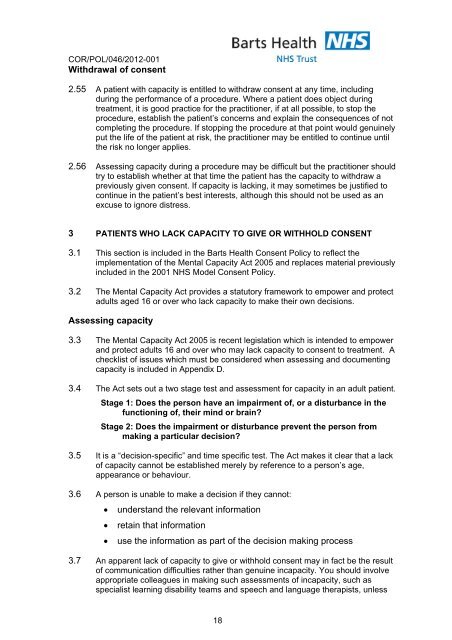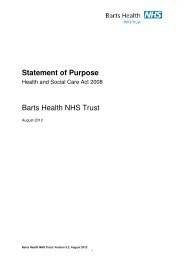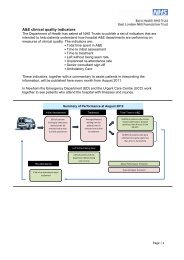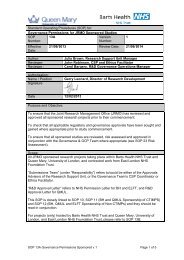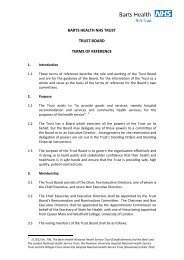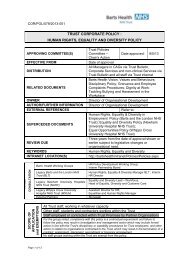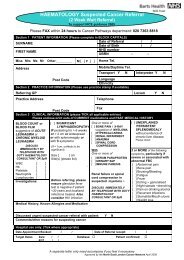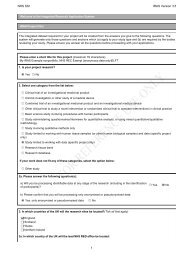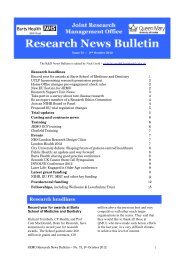Consent to examination and treatment - Barts Health NHS Trust
Consent to examination and treatment - Barts Health NHS Trust
Consent to examination and treatment - Barts Health NHS Trust
Create successful ePaper yourself
Turn your PDF publications into a flip-book with our unique Google optimized e-Paper software.
COR/POL/046/2012-001<br />
Withdrawal of consent<br />
2.55 A patient with capacity is entitled <strong>to</strong> withdraw consent at any time, including<br />
during the performance of a procedure. Where a patient does object during<br />
<strong>treatment</strong>, it is good practice for the practitioner, if at all possible, <strong>to</strong> s<strong>to</strong>p the<br />
procedure, establish the patient’s concerns <strong>and</strong> explain the consequences of not<br />
completing the procedure. If s<strong>to</strong>pping the procedure at that point would genuinely<br />
put the life of the patient at risk, the practitioner may be entitled <strong>to</strong> continue until<br />
the risk no longer applies.<br />
2.56 Assessing capacity during a procedure may be difficult but the practitioner should<br />
try <strong>to</strong> establish whether at that time the patient has the capacity <strong>to</strong> withdraw a<br />
previously given consent. If capacity is lacking, it may sometimes be justified <strong>to</strong><br />
continue in the patient’s best interests, although this should not be used as an<br />
excuse <strong>to</strong> ignore distress.<br />
3 PATIENTS WHO LACK CAPACITY TO GIVE OR WITHHOLD CONSENT<br />
3.1 This section is included in the <strong>Barts</strong> <strong>Health</strong> <strong>Consent</strong> Policy <strong>to</strong> reflect the<br />
implementation of the Mental Capacity Act 2005 <strong>and</strong> replaces material previously<br />
included in the 2001 <strong>NHS</strong> Model <strong>Consent</strong> Policy.<br />
3.2 The Mental Capacity Act provides a statu<strong>to</strong>ry framework <strong>to</strong> empower <strong>and</strong> protect<br />
adults aged 16 or over who lack capacity <strong>to</strong> make their own decisions.<br />
Assessing capacity<br />
3.3 The Mental Capacity Act 2005 is recent legislation which is intended <strong>to</strong> empower<br />
<strong>and</strong> protect adults 16 <strong>and</strong> over who may lack capacity <strong>to</strong> consent <strong>to</strong> <strong>treatment</strong>. A<br />
checklist of issues which must be considered when assessing <strong>and</strong> documenting<br />
capacity is included in Appendix D.<br />
3.4 The Act sets out a two stage test <strong>and</strong> assessment for capacity in an adult patient.<br />
Stage 1: Does the person have an impairment of, or a disturbance in the<br />
functioning of, their mind or brain?<br />
Stage 2: Does the impairment or disturbance prevent the person from<br />
making a particular decision?<br />
3.5 It is a “decision-specific” <strong>and</strong> time specific test. The Act makes it clear that a lack<br />
of capacity cannot be established merely by reference <strong>to</strong> a person’s age,<br />
appearance or behaviour.<br />
3.6 A person is unable <strong>to</strong> make a decision if they cannot:<br />
<br />
<br />
<br />
underst<strong>and</strong> the relevant information<br />
retain that information<br />
use the information as part of the decision making process<br />
3.7 An apparent lack of capacity <strong>to</strong> give or withhold consent may in fact be the result<br />
of communication difficulties rather than genuine incapacity. You should involve<br />
appropriate colleagues in making such assessments of incapacity, such as<br />
specialist learning disability teams <strong>and</strong> speech <strong>and</strong> language therapists, unless<br />
18


